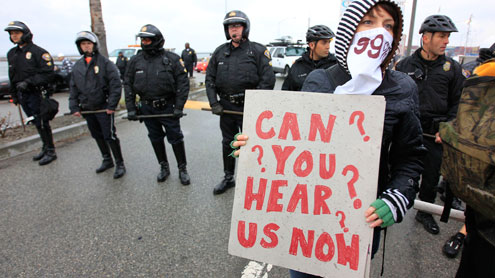In the past year, our global population has witnessed, through TV screens or firsthand, political revolutions that have completely changed the face of nations around the world. There was the Arab Spring, which saw Egypt, Libya, Syria and Tunisia, among others, rise up against tyrannical governments that had oppressed their liberties for so long. In European countries, including Spain, Portugal and Greece, citizens protested against the instability that has brought their nation’s governments and economies into a fight for survival. While many of these revolutions have created the change they called for, in our own country, the movement for change has been stagnant at best. And it seems that the calls for economic and political transformation will not be answered. The “Occupy Wall Street” protests, which started this past fall, have been ineffective in not only establishing and accomplishing their goals, but also in spreading their goals to everyday citizens throughout our country. While the Arab Spring had the support of a large majority of the involved nation’s population, OWS has struggled to find the national support needed to be successful. Many across our nation agree that change in leadership is needed in Washington and that changes need to be made in order for our nation to continue to be a world leader. The Occupy movement is still seen by onlookers as anything from radical to just a group of lazy, unemployed citizens. So, why has this movement, compared especially to the Arab Spring, failed to create the resistance needed for change to occur? On Dec. 17, 2010, the Tunisian Revolution began with the act of one man. Mohamed Bouazizi, a Tunisian street vendor, whom after years of mistreatment by government officials, lit himself on fire in front of a government office. This act of self-immolation by Bouazizi prompted a revolution that led to the then Tunisian president to step down less than a month later after 23 years in office. This was not only the beginning of change for the government and people of Tunisia but also the start of what is now known as the Arab Spring. Though Bouazizi may not have known it at the time, his act would become the catalyst for revolutions across the Middle East and North Africa, leading to the toppling of three dictators and large transformations to occur in the region’s politics. While I’m not encouraging members of the Occupy Wall Street movement to begin lighting themselves on fire in front of the New York Stock Exchange, some type of action is needed by them to show that they are serious and passionate about change being made. While they set up their tent communities in cities across America and make claims against big business and its effect on politics, their claims fall on deaf ears without actions to give validity to their movement. Looking back to our nation’s first revolution, against the British government’s control over the American colonies, revolutionaries made it clear through their actions that they were not going to give up until independence was achieved. A prime example the OWS could take some notes from is one that all of us have learned about since elementary school. The Boston Tea Party, led by colonial revolutionaries in response to taxation by the British government, was the action needed to spark change and show that they were not going to back down from their demands. OWS’s demands are similar to those of our forefathers; they want independence from what they see as unfair, unjust actions against the citizens of our nation. But instead of leading a charge against the corporations that they speak against, they use their Apple Macbooks and iPhones to express their ideas over Facebook while drinking Starbucks coffee. If they want to create the change in which they seek, why not follow the actions of those Americans before us and hit their opponents where it hurts – in their wallets. The efforts by the OWS are going to continue to be ineffective without any real action. It is easy for our nation’s leaders, both in politics and in the business world, to continue to disregard the cries of the movement when they aren’t being truly affected by the current actions being taken. The Occupy movement as a whole needs to take a step back and consider what goals they hold the most dear, then think about how they can achieve real change through garnering more support and making those they fight against realize they’re serious about the change that they seek.
Brad Tipper is a sophomore majoring in political science and economics. His column runs biweekly on Thursdays.






